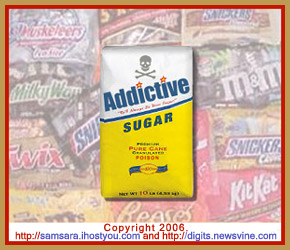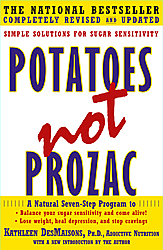Everyone knows that addictive substances can ruin your health and your life. When we think of addictive substances, we think, alcohol and drugs. Here’s one you may have not considered to be an addictive substance.
Sugar
Here are some traits of addictive substances. Refined sugar acts like a drug in your body and fits the criteria for an addictive substance.
Addictive substances cause the release of neurotransmitters serotonin and dopamine.
Serotonin creates a feeling of calm, contentment, and a lessening of depression and anxiety.
Dopamine is considered to be one of the brain’s primary “pleasure chemicals,” and is found in areas of the brain linked to experiences of joy and reward. No wonder why that ice cream cone, cookie, and candy bar make us feel so good!
People ingest addictive substances despite negative consequences and the intention to stop. This is true for drugs, alcohol and sugar. The problem is sugar is everywhere, its perfectly legal for all ages and socially acceptable. When you decide to stop eating refined sugar, it takes a lot of prior planning and determination to be successful.
Our bodies build up a tolerance to addictive substances. Our taste buds can be corrupted! Once you take a break from sugar, you’ll discover that your taste buds can adapt to a lot less extreme sweet flavors.
Heavy users of addictive substances cannot function without it. Many people with a sugar problem can’t get along without it. If you think you’re not one of those people, just give it a try for 24 hours and see how you do.
When you stop an addictive substance, you experience withdrawal symptoms. Giving up all forms of refined sugar can be really really uncomfortable. Many folks experience irritability, headaches, and other flu-like symptoms for the first 48 hours. After that things usually get better.
Addictive substances are both physical and emotional. This applies to sugar as well. It doesn’t help that the food industry knows this fact too. They design advertising and product placement to tug at your emotional heart strings.
Fully understanding that you are up against a highly addictive substance is the first step in dealing with reducing your refined sugar intake. Here are some strategies that will help you in this journey.
1. Keep it out of your house! The less products with refined sugar lurking in your cabinets, the better shot you have at conquering a sugar addiction. Make your kitchen a sanctuary with health supportive foods and no junk!
2. Eat real food. The more foods you eat that do not contain unpronounceable ingredients, the more your taste buds will change.
3. Eat 3 regular meals a day. Being consistent with food helps your blood sugar stay steady. Never leave your house hungry. Always plan ahead and prepare food to bring along so you’re not at the mercy of the sugar laden toxic food environment.
4. Don’t forget forms of non caloric nourishment. Things like walking, sunshine and sleep are as important as vitamin rich produce. Make time for these in your life and you’ll find that sugar holds less power over you.
5. Create alternative ways to deal with stress. Many many people reach for foods with refined sugar when they are under stress, many don’t even realize it. Pay attention and identify when you find yourself doing this. Find ways to deal with stress that don’t involve eating! Play with a pet, call a friend, take a hot bath, meditate, breathe. Stress reduction and relaxation help to balance blood sugar.
6. Be kind to yourself. Be compassionate. If when you fall off the refined sugar wagon, let go of guilt and shame. Just like other addictive substances, multiple attempts are part of the process.
For more information on ways to deal with sugar addiction, I’d like to refer you to the work of Kathleen DesMaisons, PhD. She wrote Potatoes Not Prozac in the late 1990’s, a groundbreaking book that has changed my opinion about sugar. Back in my dentist days, I simply thought sugar caused tooth decay and could make you fat. Now I know its not an “empty calorie” as the food industry wants you to think. Refined sugar is a highly addictive anti-nutrient. Click here to learn more about Dr. DesMaisons’ work with sugar addiction.



